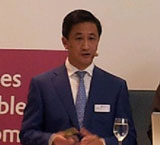
Germany-based chemicals maker Evonik Industries is targeting to increase its share in Asia Pacific from 18% to 30% by 2020, through its projects in Asia. “The growth is not specific to any area but we have had good growth in China,” said Executive Board Member Dahai Yu. “We are also increasing our focus in Southeast Asia and with the ASEAN integration expect to see further growth,” he added. He also referred to the LOI signed with Malaysian petrochemicals firm Petronas early this year to jointly embark on speciality chemicals plants within Petronas’s Refinery & Petrochemical Integrated Development (RAPID) project in Pengerang, Johor, Malaysia. Under the LOI, the two parties will construct and operate facilities for the production of hydrogen peroxide (250,000 tonnes), C4 co-monomer and oxo-products within RAPID. The hydrogen peroxide will be used on site to produce propylene oxide by the licensed, eco-friendly HPPO process Evonik has jointly developed with ThyssenKrupp Uhde.
Though these projects are slated to come on stream in 2016, RAPID has had teething problems and when Yu was asked about this, he said, “RAPID involves an investment of US$20 billion; it’s a massive project and any project of this scale is bound to run into problems.” Yu did not comment on the completion and start-up but said that Evonik was committed to the project. Petronas had an earlier deal with competitor BASF for new speciality chemicals facilities but both companies terminated plans after failing to agree on terms.
Meanwhile, Evonik generated about EUR3 billion with its products in the plastics market in 2012, continuing to grow at above-average rate. Roughly two thirds of this are generated in the construction segment and general industries, including additives. “EBITDA has been reduced but we have still achieved in the range of EUR2 billion, which is a good range,” said Yu. Admitting that the firm is facing tougher times with slow global GDP growth, especially in the Asian and European regions, reflected in the lower sales in the first half of 2013, compared to the same period in 2012, Yu said, “We need to work harder but we still have the confidence to grow and innovate so will continue on this path.”
(PRA)















